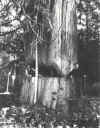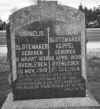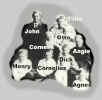|
by Henry Slotemaker Part Three---Move to Lynden Making a move of some 2000 miles to the wooded wilderness of the Pacific Northwest was a decision that was not rashly made. This required much careful and prayerful planning. Grandpa and Grandma had reached the age of 60, and mother and Dad were planning matrimony. Foster daughter Ida had married a man named Peter DeVries. Consequently there were just the four of them to whom the planning of this move was of primary concern. There were of course, intimate family ties that must be considered, but these could not determine the final decision. Although the reports were favorable, one cannot
see things clearly with the eyes of others. As was done some 18 years
earlier before leaving the Netherlands, so also now it was decided to
see for themselves. This time Dad was the logical person to do the
scouting. About March, 1, 1900 he boarded the train that took him to
the most northwesterly corner of the state of Dad got a job at a saw mill about 3 miles west of Lynden near what is now the Loomis Trail Road. A creek was dammed creating a mill pond into which the logs were dumped for floating them to the mill. Dad never told us much about his work at this mill nor the shingle mill at which he later worked during the six months he stayed before returning to Iowa. He did tell us about the night he spent in the mill bunk house. Most of the employees at the mills were single men, many of whom stayed only a short time and then moved on to another job. To accommodate these transients the mills had a bunk house and a commissary. The meals at the commissary were good, but the bunkhouse was something else. He had scarcely gotten in his bunk when he felt the familiar sting of a flea. As he reached over to the area of his anatomy where he hoped to catch the culprit, he felt another sting, then a half dozen at once. It seemed as if the whole family, including uncles and aunts, cousins and in-laws had all converged on him. Dad always claimed that fleas were partial to him, if there was a flea within a mile it would find him. He realized that he couldnít survive the night in the bunkhouse. So he went outside, shook the fleas out of his clothes the best he could and headed for the barn where the horses were kept, and slept in the hay, after the few fleas that still clung to him had eaten their fill and were sleeping it off themselves. When morning came he faced the problem of where to spend the next night. He knew that sleeping in the barn was not permitted, nor did he want to resort to such accommodations. Besides he was sure that a horde of fleas was already on his trail to the barn. The Peter Dykstra family (acquaintances from Iowa how had preceded Dad to Lynden) lived about a mile from the mill where he also worked. Dad told him of his plight, and with genuine frontier hospitality they invited Dad to stay with them for a room and board. A by-product of this arrangement was a lifelong friendship. Two other young men whose friendship meant much to Dad during that summer and in later years were Tom Heeringa and Sam Bajema. I can imagine that Dadís letters home told in glowing terms of high snow-capped mountains, tall timber, and long summer days and cool nights. The summer sped by quickly and as he reminisced while preparing to return to Iowa, I can imagine his thoughts following a course something like this: "This has been a season of great blessings and rich experiences. Iíve seen a lot of geography, have established valuable friendships, had steady employment and good health making it possible to contribute to the economy. Iíve also had the opportunity and privilege of teaching an adult Sunday school class at the small country school house where hopefully some of the transient mill hands were strengthened in faith or brought to repentance." He had also come to the conclusion that this was where he wanted to establish his home. Now to return to Iowa to report his experiences and findings, and make preparations for the move which he was confident would result. He had little room in his suitcases for souvenirs, but he did take along some choice apples and pears. He also cut a piece of fir bark from one of the big trees, about a 6 inch cube. Upon arriving home, when neighbors and family came to welcome his back and hear his report, he first treated them to the mouth-watering fruit, the like of which could not be found in Iowa. But when he tossed that piece of bark on the dining room table, no one could identify it, and found it difficult to believe when he told them. At a consultation with all those who were concerned, the decision was soon made to go to Washington. The next few weeks were busy ones preparing for 2 big events: the wedding of Mother and Dad and the move to Washington. The wedding date was set for Nov. 26. All other preparations having been completed, they started on their journey the following day. An adventurous honeymoon to be sure, even though they were accompanied by Grandpa and Grandma. This trip was without special incident until reaching Leavenworth, Washington, where the train was delayed because a slide in the mountains ahead covered the tracks. By the time the train could go again the little village of Leavenworth was sold out of all foodstuffs. They soon arrived at their destination, where they joined friends and acquaintances. Little was told about that first winter in
Lynden, but Iím sure that especially the women experienced a measure
of nostalgia. But again, to return was out of the question, that would
indicate defeat, and they were not defeated. They soon Dad operated the small farm by the river, combining dairy, poultry, and fruit growing plus some off the farm employment. Commercial fruit raising was at that time an important part of the economy. Central Washington fruit production was still in its infancy, as it was dependent upon irrigation, which was then it its early stages of development. As the Central Washington fruit industry increased it decreased on the coast. Dad had a light weight one-horse spring wagon on which he hauled produce to Bellingham. The springs were important as without them eggs could not be hauled. They would crack as they jostled over the rough roads. He also used this wagon to haul cream to the small creamery in Lynden. He would also pick up the cream of 2 or 3 of the neighbors. Continue to Part 4---Born American
|


